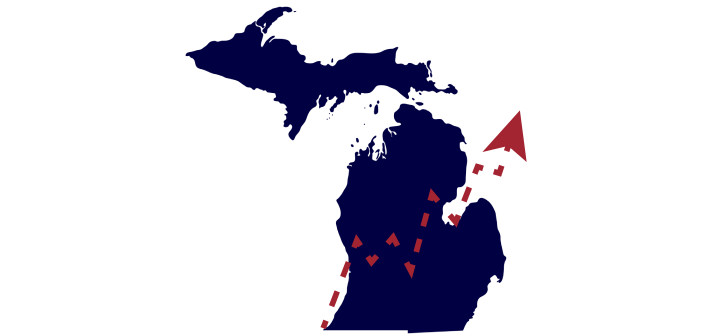It has been a decade since the Great Recession, and Michigan’s economic recovery is a mixed bag. The state got hit harder than the rest of the nation. Our economy declined by an average of 6.5 percent in 2008 and 2009, while the nationwide economy declined by an average of 1.9 percent. Michigan’s unemployment rate peaked at 14.5 percent, compared to ten percent nationwide.
Even though Michigan’s economy declined by more than that of the nation, the state’s economic recovery has not been significantly better. The nationwide economy has grown by an average of 2.1 percent during the recovery while Michigan’s economy grew by 2.5 percent. Thus, Michigan’s economy is not growing fast enough to make up for lost ground.
This is especially problematic because Michigan was a “one state recession” during the 2000s. Between 2003 and 2006, our economy shrank by an average of 0.9 percent annually, while the rest of the nation was growing by an average of 2.7 percent. Michigan’s economy has recovered so that it is larger than it was in 2001. However, the economies of both Flint and Detroit are smaller now than they were then.
Employment has fully recovered nationally following the Great Recession. There are ten million more jobs now in the U.S. than before the recession. In contrast, employment in Michigan peaked in the year 2000, and Michigan has over 200,000 fewer jobs than in 2000.
An issue is that Michigan’s economy remains dependent on the auto industry. Auto manufacturing is eight percent of Michigan’s economy despite being only one percent of the national economy. Since 1991, the “Big 3” auto companies have collectively lost a third of their market share. Only 44 percent of cars sold in the U.S. are produced by GM, Ford and Chrysler, whereas in 1991, these companies produced 66 percent of cars sold. Each point of market share represents approximately 170,000 cars sold. Thus, losing 22 points of market share is the equivalent of losing 3.75 million car sales every year. This largely explains why auto employment has shrunk by 50,000 in Michigan since 1991, despite being largely unchanged in the rest of the U.S.
Whenever the economy enters into a recession, durable goods such as cars, furniture and appliances are the first things consumers cut back on. This is why recessions disproportionately impact Michigan. Michigan’s economy is still heavily reliant on this type of manufacturing as 15 percent of the state’s economy involves producing some sort of durable good. One thing holding Michigan’s economy back is that General Motors has continued to lose market share every year post bankruptcy. GM controlled 23 percent of the auto market in 2007, compared to 17 percent in 2017.
Michigan’s economy and employment are both growing, yet the state has yet to regain the lost ground. A continued reliance on the auto industry puts the state at risk for the next recession, particularly if General Motors continues to lose market share.








